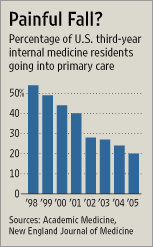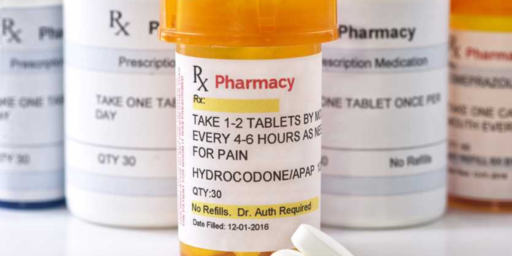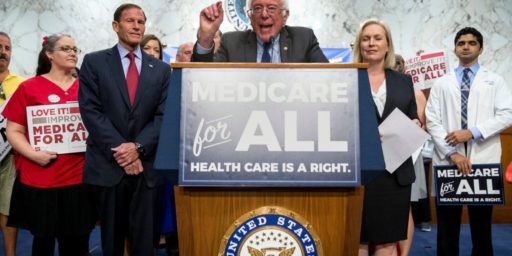Choosing A $2,000 Drug Over A $50 Alternative That Works Just As Well
Thanks to current patent and drug regulation laws, we're paying up to $2,000 for a drug when there's a drug that does the same thing for orders of magnitude less.
The Washington Post reports on two drugs that are both equally effective in dealing with a serious problem afflicting the sight of elderly Americans, with the only difference being their price, and why doctors are more likely to prescribe the one that costs 40 times more:
The two drugs have been declared equivalently miraculous. Tested side by side in six major trials, both prevent blindness in a common old-age affliction. Biologically, they are cousins. They’re even made by the same company.
But one holds a clear price advantage.
Avastin costs about $50 per injection.
Lucentis costs about $2,000 per injection.
Doctors choose the more expensive drug more than half a million times every year, a choice that costs the Medicare program, the largest single customer, an extra $1 billion or more annually.
Spending that much may make little sense for a country burdened by ever-
rising health bills, but as is often the case in American health care, there is a certain economic logic: Doctors and drugmakers profit when more-costly treatments are adopted.Genentech, a division of the Roche Group, makes both products but reaps far more profit when it sells the more expensive drug. Although Lucentis is about 40 times as expensive as Avastin to buy, the cost of producing the two drugs is similar, according to scientists familiar with the drugs and the industry.
Doctors, meanwhile, may benefit when they choose the more expensive drug. Under Medicare repayment rules for drugs given by physicians, they are reimbursed for the average price of the drug plus 6 percent. That means a drug with a higher price may be easier to sell to doctors than a cheaper one. In addition, Genentech offers rebates to doctors who use large volumes of the more expensive drug.
“Genentech continues to maintain that Lucentis is the most appropriate medicine,” the company said in a statement, adding that it costs “significantly” more to make and is tailored for use in the eye. The drug “has made an immense impact.”
Many ophthalmologists, however, are skeptical that it provides any added value over the cheaper alternative.
“Lucentis is Avastin — it’s the same damn molecule with a few cosmetic changes,” said J. Gregory Rosenthal, a Toledo ophthalmologist who, outraged by the price, co-founded a group called Physicians for Clinical Responsibility to protest its use. “Yet Americans are paying a billion dollars every year for no good reason — unless you count making Genentech rich.”
Genentech, of course, will argue that there are other benefits:
“Genentech continues to maintain that Lucentis is the most appropriate medicine,” the company said in a statement, adding that it costs “significantly” more to make and is tailored for use in the eye. The drug “has made an immense impact.”
Many ophthalmologists, however, are skeptical that it provides any added value over the cheaper alternative.
“Lucentis is Avastin — it’s the same damn molecule with a few cosmetic changes,” said J. Gregory Rosenthal, a Toledo ophthalmologist who, outraged by the price, co-founded a group called Physicians for Clinical Responsibility to protest its use. “Yet Americans are paying a billion dollars every year for no good reason — unless you count making Genentech rich.”
The story of Genentech’s two drugs, Lucentis and Avastin, began with a scientific marvel — a breakthrough in biology that, thanks to the vast budgets of U.S. entitlement programs, has produced enormous financial returns.
Those profits have yielded benefits. By paying for such drugs without regard to cost, the Medicare system has helped stimulate investment in medical research that contributes to the development of more lifesaving technologies.
There’s certainly no doubt that pharmaceutical research costs vast amounts of money, that medical science in the abstract and patient care specifically have both benefited greatly from the new drugs that have been developed by the industry over the past several decades, and that there is economic logic in providing these drug companies with patent protection for a reasonable period of time to allow them to earn back the cost of investment in new medications as well as provide the funding that they need to conduct the research to develop new drugs. It is, you might say, something of a virtuous cycle that benefits both present and future patients and any argument aimed at disrupting it ought to be careful in what it proposes. There’s a reason why the U.S. is the home of most of the breakthrough pharmaceutical products of the past half century, and we’d be foolish to mess with the system so much to the point that we kill the goose that lays the golden eggs.
Taking all that into account, though, there’s no denying that there are flaws. Thanks to rebates and other financial arrangements, doctors are often under financial pressure to prescribe one drug over a cheaper drug that may be just as effective, or to prescribe a brand name drug when far less expensive generic brands of the same medication are available. Similar incentives seem to be created by the Medicare reimbursements paid to doctors which, as the article quoted above notes, is based in part on the cost of the medication provides, a policy which seemingly paradoxically gives physicians the incentive to over-prescribe and to prescribe a more expensive alternative when a cheaper drug would be equally effective. To some extent, the review process that third-party insurance companies provide can act on a check on the worst of these practices but quite often it does not, or patients simply insist on being given the specific drug their doctor prescribed even if it means paying more out of pocket otherwise. In the specific case of Lucentis and Avastin, there’s more at work because the company that has developed both drugs seems to be specifically aimed at avoiding the substitution of the cheaper alternative:
[W]hile Genentech has aggressively marketed the more expensive drug and sought to restrict the use of the cheaper one, critics say, Medicare has been powerless to do anything but pay up.
That’s because over the past seven years, despite pleas from the Food and Drug Administration and doctors groups, Genentech has maintained the barriers that make it harder for doctors to use the cheaper drug.
Avastin was not originally intended for use in the eye, and the company has refused encouragement from the FDA to seek official approval for using it to treat eye ailments, according to unpublished internal FDA documents. This forces doctors to use it “off-
label,” or in ways not specified on the medicine’s label.The company also packages the drug, which was approved for cancer in 2004, in doses far too big for use in ophthalmology, meaning that the drugs must be repackaged by other companies for use in the eye, raising the risk of contamination.
Genentech has argued that Avastin may pose a greater danger of severe side effects than does Lucentis, although independent scientists say such worries are unsupported by the six trials that have been conducted.
In a statement, the company said that it has not sought FDA approval of the cheaper drug for use in the eye because it has already developed one drug for the ailment known as wet age-related macular degeneration, or wet AMD.
“Genentech continues to maintain that Lucentis is the most appropriate medicine for wet AMD as supported by clinical and other scientific data,” the statement said.
“We specifically designed Lucentis for use in the eye and to clear quickly from the bloodstream after leaving the eye to potentially minimize side effects,” the statement said. “The two medicines were designed for different purposes and, we believe, may have different systemic and ocular safety profiles when used in the eye.”
Both drugs apparently remain under patent protection, so the alternative of some other company manufacturing Avastin and selling it in a manner better suited to use in ophthalmology is not presently an option. Similarly, it doesn’t appear that the FDA has the authority to authorize a drug like Avastin for off-label use without an application from the manufacturer, and even if it did it certainly doesn’t have the authority to force Genentech to sell the drug in a manner that can be used in ophthalmology. Similarly, the Medicare program, which quite likely bears the largest burden when it comes to the cost differences between these two drugs given the fact that wet AMD is most common in people who are old enough to be on Medicare, doesn’t have much authority in these situations:
[I]n 2012, the Medicare program and its beneficiaries spent $1.2 billion on Lucentis, according to The Post’s analysis of Medicare data.
Medicare officials said they have no choice but to pay the bill when a doctor prefers to use Lucentis.
“We do not have the authority to dictate treatment based on cost,” Tami Holzman, a spokeswoman for the Centers for Medicare and Medicaid Services, said in a statement. “Under current law, Medicare must cover treatment that is deemed reasonable and medically necessary by a physician or other provider.”
On some level, this is a policy that makes sense. The idea of a centralized government authority overriding medical decisions of thousands of physicians across the country is somewhat disquieting to say the least. Nonetheless, it strikes me that there are some reforms that could be implemented rather easily that wouldn’t go that far. The idea of doctors receiving “rebates” — which in any other line of work would be called kickbacks — for prescribing certain drugs would strike me that comes pretty close to being a breach of medical ethics if not anti-trust laws. While it would be next to impossible to police every way in which pharmaceutical companies “grease the skids” with physicians, some of the most egregious examples can certainly be dealt with if the will existed. After all, the object is supposed to be for the physician to be prescribing the medically appropriate drug, not the one he or she may have a financial interest in prescribing.
Another potential reform would be far more difficult to accomplish. As I said above, nobody that I’m aware of disagrees with the idea that we all benefit significantly from the pharmaceutical industry and that drug companies should have some protection under the patent laws that gives them the assurance that they’ll be able to earn a profit on a drug that they’ve invested millions of dollars and vast amounts of research in. Much like the rest of our patent system, though, the laws and regulation covering prescription drugs have clearly become far too biased in favor of the pharmaceutical industry. Notwithstanding the fact that drug company lobbyists on Capitol Hill are going to object, it’s long past time to take a look at those laws and reform the balance between protections for innovators and encouragement of free market exploitation of new information in a manner that is beneficial for everyone. The drug companies would kick and scream about it no doubt, but when it leads to perverse results like those that have arisen with Avastin and Lucentis then something is clearly wrong.







The position of drug companies and the doctors & insurance companies who enable them seems to be “If you don’t allow us to systematically rip you off, we will stop producing new drugs.”
Ah, the free market at work…
Why, nothing like this has ever happened before!
http://www.atg.wa.gov/pressrelease.aspx?id=23368
(I noticed a weird bug in your template (I think): For some reason the HTML title element is the following “Choosing A ,000 Drug Over A Alternative That Works Just As Well”, for some reason removing the “$2” from the title. Is there some kind of script execution protection on that field?)
The millions they invest comes from a system that rips off American Consumers. It’s a vicious cycle. At some point we have to say, enough.
The PPACA is an attempt at saying, enough, to a system that is the most expensive and delivers the worst returns. Of course we all know you don’t like the website.
Medicare Part D was a huge gift to big Pharma.
Enough.
It’s a dance that is becoming unsustainable.
Also, in 2003, the Republican Congress passed the Medicare Part D Supplemental Prescription Drug Program and they specifically wrote into the legislation that the federal government would be prohibited from negotiating lower prices for prescription drugs.
At this time we’re not sufficiently serious about these issues to do anything about it.
Reminds me of the long debate among neurologists of the efficacy of brand name vs generic anti-convulsants or the remarkable price difference between 80mg aspirin for kids and 81mg aspirin prescribed for heart patients.
As more and more health care is being paid by the tax payers, fixing these price games might work its way up the to do list one day.
{ Citation needed}
I’ve seen this blithely cited by many conservatives in the health care debate, but never seen it documented. Many of the world’s biggest pharmaceutical companies are in fact European companies.
Seems like the free market is not magically solving problems in the drug market,and is leading to grave injustice, thus requiring regulation. Is our libertarians learning?
This sounds like a case where compulsory licensing would make sense. Perhaps the government could rely upon the Kelo decision to seize the patents under eminent domain.
An option along those lines would probably have very lasting repercussions, possibly for the worse, possibly for the better. It would create a very credible threat when working with the drug companies in the future, and be a major disruptive event.
At the very least, the FDA should be empowered to perform its own studies on the safety and effectiveness of common off-label uses, and be funded to the level where it can actually do so.
But if only we had no Medicare, Medicaid, or FDA, then all the drugs would be dirt-cheap! A veritable paradise that would be…
How much research done on one form of government grant or another are converted to private IP?
I suspect it is greater than the “zero” implied by the standard narrative.
Peripherally related question: why does making nominal changes (“the same damn molecule…) considered research rather than marketing? Why isn’t securing these two drugs under distinct patents considered an abuse of the patent system?
BTW, it bears pointing out that this
would be considered an illegal kickback in most other industries.
@Stonetools: And no one mentions Takeda….one of the biggest drug companies in the world.
Then there are the generic companies: Teva, which is Israeli.
@Dave Schuler: The major argument you’re going to have is whether the newer molecule is an “obvious” extension of the former. There’s a lot of stuff that doesn’t get through the 103 filter.
And you’ve still got to get FDA approval of it–which means going through all those tests again. Or at least to prove biosimilarity (also needed for generics, by the way.)
Not as simple as one thinks. Different dose levels for different applications I can see getting patents, although you’re not going to get a patent on the drug itself, but on the use of the drug.
The meaning of “miraculous” seems to have changed…
Your blog software appears to be interpreting the “$2” in the title of the article as some sort of string formatting placeholder, as it’s being replaced with an empty string in the HTML TITLE.
If someone really wanted to find an issue where libertarians ought to be meeting liberals and working towards rational limits on monopoly practices they’d target IP. For all of the whining about government regulations the essential elements of the problem are wildly broad IP protections and the anti-competitive laws (no Medicare Rx negotiating allowed for ex) that help sustain the monopolies.
First, I am pleased to see this post written by our favorite libertarian. Maybe Doug is seeing the light!
Next, WRT
Amusing anecdote: My wife went to apply several years ago for a position with a medium sized medical practice. One of the big perks, she was told, is that different Big-Pharma reps bring in free lunch for the entire office 4 days per week. She declined the position on ethical grounds.
If blatant graft is not sufficient to trigger anti-trust law, I can’t see how refusing to repackage a drug for (currently) off-label use will raise eyebrows.
A free market cannot operate perfectly without perfect information. Short of that, government intervention is required.
@Stormy Dragon:
Which (perhaps irrationally) has me concerned about its strength against injection-type malware attacks. Content-text strings should be deliberately and carefully isolated. – now back to the topic at hand!
@Tony W:
That was my concern as well.
It is well accepted and believed that the cure for baldness is in the grasp of researchers but the pharmaceutical companies feel that it would be so cheap ( $100 or less for a years supply) that they would not make a profit.
Huh? In our system the doctors are endpoint sales representatives.
You can’t love that market and complain about it too.
If you don’t want a profit motive, go to a nonprofit model.
An interesting followup line of inquiry would be “Which drug does the VA use, and how much does it pay for it?” since the VA is allowed to negotiate prices.
@john personna:
This sort of relationship is expressly unethical:
Although Lucentis is about 40 times as expensive as Avastin to buy, the cost of producing the two drugs is similar, according to scientists familiar with the drugs and the industry.
Producing costs is NOT the same as developing costs. Do you really think it costs GM $50K to build a Corvette, if all you counted were materials and labor?
And we should have expected this. We need to get people’s minds off the Epic Fail that is healthcare.gov, so let’s demonize Big Pharma.
Speaking of which… isn’t it time for Obama to “pivot to the economy” again?
@Gromitt Gunn: I had the same question, Mr Gunn. (By the way, any relation to the 50s TV star Peter?) The VA Health system is, we all know, roughly the equivalent to the British National Health, in that it is completely government owned — truly ‘socialized medicine’. According to “Retinal Physician” of 10/1/2011, “Two recent incidents in which tainted Avastin caused a total of 16 ophthalmitis infections in south Florida and in a VA facility in Nashville have raised new safety issues related to the role of compounding pharmacies in breaking down Avastin into single dose syringes….(Caused the VA to drop) it’s use of Avastin…”
The peculiar place of ‘compounding pharmacies’ that are subject only to State regulators also led to spinal cord infections across the country fairly recently. I guess paralysis of some patients got media attention whereas the ocular infections of VA patients did not.
For Genentech this is good business, of course, in the sense that Milton Friedman defined good business. In the ‘old days’ of my youth there was a General Motors executive, ‘Engine Charlie’ Wilson, who was being named to an Administration office for which Senate approval was needed. The question of conflict of interest was raised whereupon the gentleman said with great seriousness that ‘whatever is good for the United States is good for General Motors and whatever is good for General Motors is good for the United States.’ By which he meant that business was properly conducted with an eye to the good of the greater American community. He’s gotten lots of ridicule for his statement from pundits who don’t remember the national-minded ethics of the ‘greatest generation’ or their children we ‘silent generation’ folks.
In Forbes (6/26/2013) Steve Denning showed the shallowness of Dr Friedman’s thinking: “The Origin of the World’s Dumbest Idea: Milton Friedman.”
If the only option to this kind of rent-seeking is nationalization, then by golly we ought to use the Kelo decision and make Genentech a government enterprise like the Labs in Oak Ridge or the TVA.
@Dave Schuler: Does the opinion reflect an aspirational ethical rule or might there some enforcement teeth in there?
@Dave Schuler:
I think we are all aware that the for-profit medical industry seeks to self-police to some degree and also reassure patients.
But if we know doctors we also know stories, the $2k speaking fee for a night out with a friendly drug company, or whatever.
Therefore we might divide on our confidence of the self-policing, as opposed to just the reassurance.
Put differently, we ask doctors to serve two masters.
I guess they are supposed to know when to take the fees, and when to prescribe the generics.
Ophthalmologist (or at least someone claiming to be one on Reddit) comes up with a pretty reasonable explanation as to why the more expensive drug is usually chosen.
For those too lazy to click on the link:
@JohnMcC:
Really, dude? You’re going to do that? That music will be stuck in my head for the next three hours.
Big Pharma does that all by itself with no help from anyone else…
It’s a great combination. The sole supplier considers profits solely so it makes short term sense to
price gougeride the price curve down while they exploit the monopoly while the demand is chummed and the alternative market littered with examples of Gresham’s Law’s race to the bottom amongst the compounders.Talk about market failures that cry for action.
@rudderpedals:
It’s more than aspirational. As professionals the local medical associations haveaffirmative responsibilities to acquit, admonish, censure, or place on probation a physician accused of unethical behavior or suspend or expel him or her from AMA membership which in turn can be a factor in determining whether a physician is to lose his or her license or face civil liability. In some states unethical behavior alone on the part of a physician is enough to cause the loss of license for him or her.
@Al:
How difficult would it be to make a device to transfer the Avastin cleanly to the single dose syringe?
Would it be legal for a pharmacy to set up a verified clean facility to make the transfers and distribute the drug in guaranteed sterile single dose syringes for national distribution? They could overnight it on dry ice and sell it for $100-150 and everyone but Genentech wins.
@Grewgills:
Genentech owns both drugs.
@Al:
I understand that, but given that a compounding pharmacy can basically repackage Avastin for one dose use to treat this ailment, can a third party pharmacy set up national distribution with guaranteed clean single doses avoiding the other poorly regulated compounding pharmacies that are responsible for the non sterile transfers?
@ Michael Reynolds
Back in the day you could see Steve Douglas’ in clubs all over Marin, and he never failed to play Peter Gunn, one of his signature songs.
Ever wonder what barbed wire sounds like? Check out Roy Buchanan’s killer cover of Peter Gunn
I bet it’s also getting chosen because of a legal risk analysis. The doctors cover themselves better against malpractice claims because of the higher risk associated with the lower-cost medication.
It’s not all “because they’re greedy.”
@Dave Schuler:
So the doctor’s wife telling me about the conference, free in Hawaii, should someone report her?
It seems pretty institutional. If there are these benefits, and there are these ethical standards, obviously the two do not meet.
The policing probably catches the egregious but leaves a lot to be uncomfortable about.
@Grewgills:
I’d be willing to bet real money that compounding pharmacies offer such guarantees now. They certainly don’t ship product with the caveat that it may cause a meningitis outbreak; they just happen sometimes. Why are doctors suddenly going to trust your poorly regulated compounding pharmacy over another one?
I should point out that a big problem here is that Medicare basically has almost no claims review. This is a big part, also, of why they pay out one in five dollars for fraud. It’s also a big reason why supports of single payer can claim — incorrectly — that Medicare is more efficient than the private sector. The private sector does have claims review and does push for cheaper alternatives. But Medicare just vomits out money. To put in the kind of infrastructure necessary to stop this kind of abuse (which happens a LOT) they would have to increase their bureaucracy quite a bit, thus undercutting their claim to be more efficient.
(Although when one-fifth of your claims are fraud, I’m not sure you can really claim to be that efficient.)
@Grewgills: The issue you address is not the business model called ‘compounding pharmacy’, it is the regulation of these businesses. The infections caused by spinal injections that had been prepared by the New England Compounding Center caused over 700 patients to become partially paralyzed and over 60 died. The legislative response was S-959 introduced by Sen Harken in May of ’13. Checking on the wonderful website Govtrack-dot-US, I see it passed Committee and has not been voted on in the Senate.
A strongly worded letter or email or telephone call to Sen Reid’s office would be a reasonable thing to do. I’m picking up the phone right now. His Washington office: 202-224-3542.
Medicare needs to be able to say no. We have been dancing around that issue for quite some time now.
@JohnMcC:
I’m on it.
I guess what I am looking for is some other independent verification, in the likely event that the legislation you mentioned goes nowhere.
@Tony W: This is an extremely common thing. Drugs reps often bring in “goodies” or buy lunches for staff at clinics in an attempt to get the doctors there to push their drug. I didn’t realize this wasn’t commonly known. Even as a kid I thought it was pretty much legal bribery.
@Matt: Even as a kid I thought it was pretty much legal bribery.
A rational observer knows for sure it looks wrong. Even a child knows it’s funky.
You’d think a profession successfully regulated would require the professional to avoid impropriety.
@Hal_10000: First, I notice that you do not offer any proof for your statistic of “one in five dollars” spent by Medicare is fraud. So I will offer another assertion: “Less than 1% of Medicare spending is fraudulent.” I have no idea whether it’s true, of course, as I suspect that you have no idea if “one in five” is true.
Second, the “bureaucracy” that polices Medicare fraud is at least partly the FBI. And as an RN, I am told fairly regularly that if I witness Medicare fraud, I’m expected to ‘drop a dime’ on it. And although anecdotes are not proof of anything, in my >30yr career, I’ve been aware of several physicians (mostly, sometimes a hospital official or pharmacist is involved) charged with Medicare/Medicaid fraud but NONE sued by private insurance companies.
Third, it doesn’t help that due to the ‘sequester’, “federal officials are set to scale back or drop a host of investigations into Medicare and Medicaid fraud and abuse–even though cracking down government waste and cutting health care costs have been top priorities of the Obama administration.” http://www.publicintergity.org/2013/07/01/12909/medicare-fraud-outrunning-enforcement-efforts
And finally, just because you take it as a matter of fact that Medicare is horrible and wasteful does not mean that anytime Medicare is mentioned your opinion is part of the discussion. We were talking about a huge, “big-pharma” company that is abusing the system WITHOUT BREAKING THE LAW. Try to stay on topic, class.
@rudderpedals: The doctors know it’s wrong too.
@Tony W: Indeed. I could swear reading that a university-connected hospital set down a blanket ban on the sales rep-physicians meetings, which is why I asked whether there was any real teeth in the conflict of interest ethical rules binding physicians or if it was more an aspirational goal.
Yet worse IMO are those conflicts involving physicians who take big $$$ and vacations for “consulting”, and the physician’s referring patients to diagnostic companies the physician owns. I can see room for salesdroids of all kinds to bring meals if they’re going to occupy the physician’s mealtime but not if it’s tied to compensation.